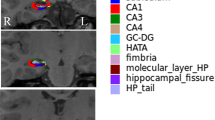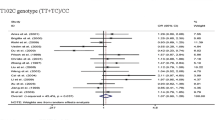Abstract
Background
Extensive distribution of the different components of renin angiotensin system (RAS) in the brain, along with their roles in promoting anxiety, depression and brain inflammation, opposes RAS as a potential therapeutic target in major depression. Actions of angiotensin II, the main product of RAS, are reduced by antidepressants and this signifies the complex interplay of different mechanisms involved in response to therapy. Here, we hypothesized that genetic polymorphisms of RAS may affect the outcome of therapy in depressed patients.
Methods
The frequencies of variants of genes encoding for angiotensin-converting enzyme (ACE) insertion/deletion (I/D), rs4291 and rs4343 polymorphisms were determined in extracted DNAs of 200 newly diagnosed depressed patients. Patients were randomly divided into two groups, one treated with fluoxetine and the other treated with sertraline for 12 weeks. Responsive patients were determined by psychiatrist using Hamilton questionnaire and were compared with regard to their genetic variants.
Results
Carriers of the D allele and patients with DD genotype responded significantly better to sertraline than to fluoxetine (P = 0.0006, odds ratio (OR) = 3.0, 95 % confidence interval (CI) = 1.80–5.08; P = 0.006, OR = 3.7, 95 % CI = 1.66–8.29, respectively). Mutant genotypes (GG and TT) of rs4343 and rs4291 polymorphisms were also more frequent in patients responding to sertraline, though not achieving the significance level (P = 0.162 and P = 0.256, respectively).
Conclusion
These findings suggest that special genetic variants of RAS may influence or be an indicator for better response to sertraline.
Similar content being viewed by others
References
Scott J, Palmer S, Paykel E, Teasdale J, Hayhurst H (2003) Use of cognitive therapy for relapse prevention in chronic depression. Br J Psychiatry 182(3):221–227
Taylor W, Aizenstein H, Alexopoulos G (2013) The vascular depression hypothesis: mechanisms linking vascular disease with depression. Mol Psychiatry 18(9):963–974
Flint J, Kendler KS (2014) The genetics of major depression. Neuron 81(3):484–503
Gao Z, Yuan H, Sun M, Wang Z, He Y, Liu D (2014) The association of serotonin transporter gene polymorphism and geriatric depression: a meta-analysis. Neurosci Lett 578:148–152
Gard PR (2002) The role of angiotensin II in cognition and behaviour. Eur J Pharmacol 438(1–2):1–14
Phillips MI (1987) Functions of angiotensin in the central nervous system. Annu Rev Physiol 49:413–435
Saavedra JM, Benicky J (2007) Brain and peripheral angiotensin II play a major role in stress. Stress 10(2):185–193
Peng JF, Phillips MI (2001) Opposite regulation of brain angiotensin type 1 and type 2 receptors in cold-induced hypertension. Regul Pept 97(2–3):91–102
Saab YB, Gard PR, Yeoman MS, Mfarrej B, El-Moalem H, Ingram MJ (2007) Renin–angiotensin-system gene polymorphisms and depression. Prog Neuro-Psychopharmacol Biol Psychiatry 31(5):1113–1118
Skidgel RA, Erdös EG (2004) Angiotensin converting enzyme (ACE) and neprilysin hydrolyze neuropeptides: a brief history, the beginning and follow-ups to early studies. Peptides 25(3):521–525
Yang L-M, Yu L, Jin H-J, Zhao H (2014) Substance P receptor antagonist in lateral habenula improves rat depression-like behavior. Brain Res Bull 100:22–28
Vijayapandi P, Harisankar S, Nancy J (2012) Depression-like effect of telmisartan in mice forced swim test: involvement of brain monoaminergic system. J Pharmacol Toxicol 7(2):87–95
Germain L, Chouinard G (1988) Treatment of recurrent unipolar major depression with captopril. Biol Psychiatry 23(6):637–641
Zubenko G, Nixon R (1984) Mood-elevating effect of captopril in depressed patients. Am J Psychiatry 141(1):110–111
Firouzabadi N, Shafiei M, Bahramali E, Ebrahimi SA, Bakhshandeh H, Tajik N (2012) Association of angiotensin-converting enzyme (ACE) gene polymorphism with elevated serum ACE activity and major depression in an Iranian population. Psychiatry Res 200(2):336–342
Baghai T, Binder E, Schule C, Salyakina D, Eser D, Lucae S, et al. (2006) Polymorphisms in the angiotensin-converting enzyme gene are associated with unipolar depression, ACE activity and hypercortisolism. Mol Psychiatry 11(11):1003–1015
Wright JW, Harding JW (2011) Brain renin-angiotensin—a new look at an old system. Prog Neurobiol 95(1):49–67
Rigat B, Hubert C, Alhenc-Gelas F, Cambien F, Corvol P, Soubrier F (1990) An insertion/deletion polymorphism in the angiotensin I-converting enzyme gene accounting for half the variance of serum enzyme levels. J Clin Investig 86(4):1343
Zhu X, Bouzekri N, Southam L, Cooper RS, Adeyemo A, McKenzie CA, et al. (2001) Linkage and association analysis of angiotensin I-converting enzyme (ACE)-gene polymorphisms with ACE concentration and blood pressure. Am J Hum Genet 68(5):1139–1148
Bondy B, Baghai TC, Zill P, Schule C, Eser D, Deiml T, et al. (2005) Genetic variants in the angiotensin I-converting-enzyme (ACE) and angiotensin II receptor (AT1) gene and clinical outcome in depression. Prog Neuro-Psychopharmacol Biol Psychiatry 29(6):1094–1099
Baghai TC, Schule C, Zill P, Deiml T, Eser D, Zwanzger P, et al. (2004) The angiotensin I converting enzyme insertion/deletion polymorphism influences therapeutic outcome in major depressed women, but not in men. Neurosci Lett 363(1):38–42
Gard PR, Mandy A, Sutcliffe MA (1999) Evidence of a possible role of altered angiotensin function in the treatment, but not etiology, of depression. Biol Psychiatry 45(8):1030–1034
Gard PR (2004) Angiotensin as a target for the treatment of Alzheimer’s disease, anxiety and depression. Expert Opin Ther Targets 8(1):7–14
Nasr SJ, Crayton JW, Agarwal B, Wendt B, Kora R (2011) Lower frequency of antidepressant use in patients on renin-angiotensin-aldosterone system modifying medications. Cell Mol Neurobiol 31(4):615–618
Newhouse PA, Krishnan KRR, Doraiswamy PM, Richter EM, Clary CM (2000) A double-blind comparison of sertraline and fluoxetine in depressed elderly outpatients. J Clin Psychiatry 61(8):1,478–1,568
Bennie EH, Mullin JM, Martindale JJ (1995) A double-blind multicenter trial comparing sertraline and fluoxetine in outpatients with major depression. J Clin Psychiatry 56(6):229–237
Goodnick PJ, Goldstein BJ (1998) Selective serotonin reuptake inhibitors in affective disorders—I. Basic pharmacology. J Psychopharmacol 12(4 suppl):5–S20
Sánchez C, Hyttel J (1999) Comparison of the effects of antidepressants and their metabolites on reuptake of biogenic amines and on receptor binding. Cell Mol Neurobiol 19(4):467–489
Association D-AP (2013) Diagnostic and statistical manual of mental disorders. American Psychiatric Publishing, Arlington
Miller S, Dykes D, Polesky H (1988) A simple salting out procedure for extracting DNA from human nucleated cells. Nucleic Acids Res 16(3):1215
Rigat B, Hubert C, Corvol P, Soubrier R (1992) PCR detection of the insertion/deletion polymorphism of the human angiotensin converting enzyme gene (DCP1) (dipeptidyl carboxypeptidase 1). Nucleic Acids Res 20(6):1433
Shanmugam V, Sell K, Saha B (1993) Mistyping ACE heterozygotes. Genome Res 3(2):120
Firouzabadi N, Tajik N, Shafiei M, Ebrahimi SA, Bakhshandeh H (2011) Interaction of A-240T and A2350G related genotypes of angiotensin-converting enzyme (ACE) is associated with decreased serum ACE activity and blood pressure in a healthy Iranian population. Eur J Pharmacol 668(1):241–247
Jenkins TA, Allen AM, Chai SY, MacGregor DP, Paxinos G, Mendelsohn FAO (1996) Interactions of angiotensin II with central dopamine. Adv Exp Med Biol:93–103
Medelsohn FA, Jenkins TA, Berkovic SF (1993) Effects of angiotensin II on dopamine and serotonin turnover in the striatum of conscious rats. Brain Res 613(2):221–229
Saavedra JM, Sánchez-Lemus E, Benicky J (2011) Blockade of brain angiotensin II AT1 receptors ameliorates stress, anxiety, brain inflammation and ischemia: therapeutic implications. Psychoneuroendocrinology 36(1):1–18
Arinami T, Liming L, Mitsushio H, Itokawa M, Hamaguchi H, Toru M (1996) An insertion/deletion polymorphism in the angiotensin converting enzyme gene is associated with both brain substance P contents and affective disorders. Biol Psychiatry 40(11):1122–1127
Baghai TC, Schule C, Zwanzger P, Minov C, Zill P, Ella R, et al. (2002) Hypothalamic-pituitary-adrenocortical axis dysregulation in patients with major depression is influenced by the insertion/deletion polymorphism in the angiotensin I-converting enzyme gene. Neurosci Lett 328(3):299–303
Author information
Authors and Affiliations
Corresponding author
Ethics declarations
This work was conducted in line with The Code of Ethics of the World Medical Association (Declaration of Helsinki) and Uniform Requirements for manuscripts submitted to biomedical journals. The local committee for ethics of medical experiments on human subjects of Shiraz University of Medical Sciences approved the study. Prior to interview, the written consent was attained from the participants. All patients were Caucasian and from the same geographical region.
Conflict of interest
The authors declare that they have no conflict of interest.
Role of the funding source
This work was financially supported by a grant from Shiraz University of Medical Sciences, International Branch, Shiraz, Iran (Grant No. PVB/18/91).
Rights and permissions
About this article
Cite this article
Bahramali, E., Firouzabadi, N., Yavarian, I. et al. Influence of ACE gene on differential response to sertraline versus fluoxetine in patients with major depression: a randomized controlled trial. Eur J Clin Pharmacol 72, 1059–1064 (2016). https://doi.org/10.1007/s00228-016-2079-0
Received:
Accepted:
Published:
Issue Date:
DOI: https://doi.org/10.1007/s00228-016-2079-0




